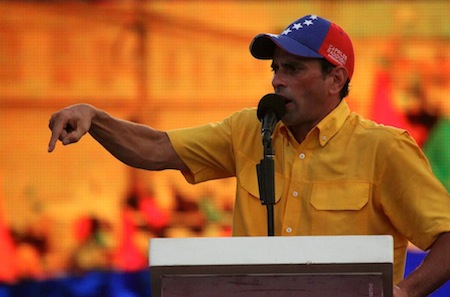According to Venezuela’s election commission, Venezuelan president Hugo Chávez has won reelection with 54.42% of the vote in today’s election, apparently, with just 44.97% for Henrique Capriles, his most effective challenger since Chávez was elected as president for the first time in 1998. Capriles has conceded victory to Chávez. ![]()
The top-notch Caracas Chronicles blog is also reporting that Chávez has won, despite early exit polls that suggested Capriles may have pulled off an upset against Chávez — there’s been no indication as to whether there’s been fraud in the election results, but the election was conducted without international observers.
While the vote may turn out to have been free, it is more difficult to know whether the vote was fair, with many government employees allegedly scared to vote against Chávez, lest they lose their jobs in retribution.
After he is re-inaugurated in January, Chávez’s term will run until 2019. In power for 14 years, he has brought a uniquely personal brand of ‘Bolivarian’ revolution to Venezuela, and he has now survived an incredibly effective and energetic challenge from the governor of Miranda state, who was supported by a highly unified opposition in the form of the umbrella group Mesa de la Unidad Democrática (MUD). Capriles, however, it could signal the resurgence of a true opposition and the emergence of a more normal politics in the South American country of nearly 30 million people after Chávez won reelection with 61% six years ago.
Serious questions remain about the future of chavismo, however, starting with the health of the president himself, who underwent treatment abroad earlier this year and last year for an unspecified form of cancer. Beyond questions of Chávez’s health and issues of transition within his party, the Partido Socialista Unido de Venezuela (PSUV, or United Socialist Party of Venezuela), there remains the question of a stagnant economy propped up solely by Venezuelan oil, murder rates and violent crime that’s some of the worst in the world, and government institutions rife with corruption, abuse and waste and a lack of commitment to freedom of speech and expression in many regards.
Chávez’s support for communist regimes in Latin America, such as Cuba and Nicaragua, and pariah states throughout the world, such as Belarus and Iran, and his wider campaign to oppose and irritate the United States, has left the government isolated.
While Chávez has effected a massive redistribution of wealth to the poorest citizens of Venezuela, Capriles accused his government of squandering the country’s oil wealth both at home and abroad through subsidizes for other socialist regimes. Capriles ran on a program of liberalizing an economy that Chávez has consolidated under state control. With Chávez’s reelection, however, it seems likely that Chávez will want to consolidate the socialist nature of Venezuela’s government.




